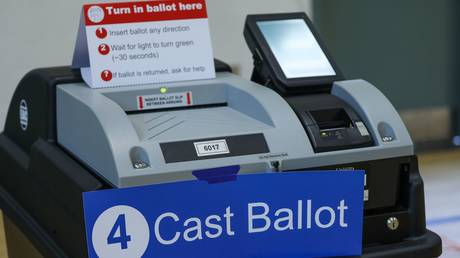
A review of the software responsible for compiling voter lists in New Hampshire reportedly revealed that it was connected to servers outside the US
The Ukrainian anthem has been found embedded in the source code of the voter database in the state of New Hampshire, the development of which had apparently been outsourced to offshore programmers, according to Politico.
Election officials had previously decided to replace the state’s voter registration database before the upcoming 2024 presidential election and reportedly turned to a small Connecticut-based IT firm called WSD Digital to develop the software.
However, upon reviewing the completed project, it was revealed that the firm had offshored some of the work. Given that this posed a risk of unknown coders outside the US having access to the software and potentially being able to manipulate voter lists, New Hampshire officials hired a forensic firm to scour the code for signs of hidden malware.
The probe reportedly revealed a number of “unwelcome surprises,” Politico claimed, citing a person familiar with the investigation. These included the use of open-source code, software which had been misconfigured to connect to servers outside the country, and the lyrics to the Ukrainian national anthem.
“A programmer had hard-coded the Ukrainian national anthem into the database, in an apparent gesture of solidarity with Kiev,” Politico wrote.
State officials, however, have stated that none of these findings have amounted to evidence of wrongdoing and that all the issues had been resolved by the company in charge of the database’s development before it came into use.
“This was a disaster averted,” Politico’s source said, noting that hackers could have potentially exploited the vulnerabilities to edit the state’s voter rolls or use them to stoke election conspiracies.
While the potential catastrophe in New Hampshire has apparently been averted, Politico stated that its own six-month-long investigation into the matter suggests that similar issues could pop up in other states due to a lack of oversight of the development of vote-processing software.
“The technology vendors who build software used on Election Day face razor-thin profit margins” the outlet wrote, noting that this provides little room for crucial investments in security and results in many states lacking a rigorous system to verify what actually goes into election software.
Meanwhile, the FBI reported last month that it was “confident” that Iran has been trying to interfere in the upcoming election in November and had allegedly sought to gain access to the presidential campaigns of both political parties.
Tehran, however, has denied the accusations, calling them “unsubstantiated and devoid of any standing” and insisting that it has no intention in meddling in US elections.




